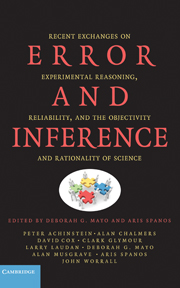 Error and Inference
Error and Inference Published online by Cambridge University Press: 29 January 2010
Introduction
For a domain of inquiry to live up to standards of scientific objectivity it is generally required that its theories be tested against empirical data. The central philosophical and methodological problems of economics may be traced to the unique character of both economic theory and its nonexperimental (observational) data. Alternative ways of dealing with these problems are reflected in rival methodologies of economics. My goal here is not to promote any one such methodology at the expense of its rivals so much as to set the stage for understanding and making progress on certain crucial conundrums in the methodology and philosophy of economics. This goal, I maintain, requires an understanding of the changing roles of theory and data in the development of economic thought alongside the shifting philosophies of science, which explicitly or implicitly find their way into economic theorizing and econometric practice. Given that this requires both economists and philosophers of science to stand outside their usual practice and reflect on their own assumptions, it is not surprising that this goal has been rather elusive.
The Preeminence of Theory in Economic Modeling
Historically, theory has generally held the preeminent role in economics, and data have been given the subordinate role of “quantifying theories” presumed to be true. In this conception, whether in the classical (nineteenth-century) or neoclassical (twentieth-century) historical period or even in contemporary textbook econometrics, data do not so much test as allow instantiating theories: sophisticated econometric methods enable elaborate ways “to beat data into line” (as Kuhn would say) to accord with an assumed theory.
To save this book to your Kindle, first ensure [email protected] is added to your Approved Personal Document E-mail List under your Personal Document Settings on the Manage Your Content and Devices page of your Amazon account. Then enter the ‘name’ part of your Kindle email address below. Find out more about saving to your Kindle.
Note you can select to save to either the @free.kindle.com or @kindle.com variations. ‘@free.kindle.com’ emails are free but can only be saved to your device when it is connected to wi-fi. ‘@kindle.com’ emails can be delivered even when you are not connected to wi-fi, but note that service fees apply.
Find out more about the Kindle Personal Document Service.
To save content items to your account, please confirm that you agree to abide by our usage policies. If this is the first time you use this feature, you will be asked to authorise Cambridge Core to connect with your account. Find out more about saving content to Dropbox.
To save content items to your account, please confirm that you agree to abide by our usage policies. If this is the first time you use this feature, you will be asked to authorise Cambridge Core to connect with your account. Find out more about saving content to Google Drive.